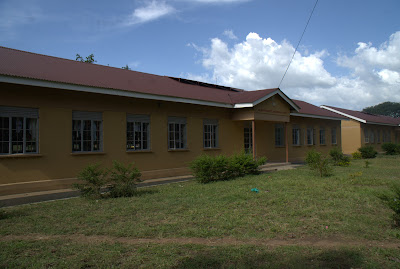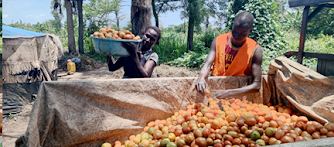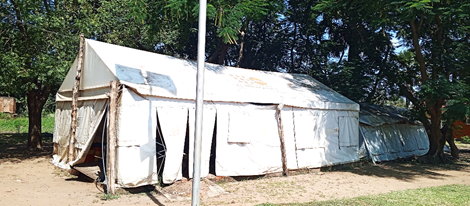DRDIP’s Safeguards intervention excites Ofua Seed School
 |
| Students' Dometories contsructed by DRDIP at Ofua Seed School, Adjumani |
“When it would rain, the whole compound was always awash with sticky mud
and again, staining our halls and classrooms”, Ijjo narrates during a visit to
assess the changes caused by the implementation of social safeguards component
of the Development Response to Displacement Impacts Project (DRDIP).
During project execution, DRDIP a project under the Office of the Prime
Minister complies with the Government of Uganda’s and World Bank’s regulatory frameworks on environmental, health, safety and
social risks to ensure that project activities do not result into unintentional harm to people and their ecosystems.
Ofua Seed Secondary School is a beneficiary
of: two students’ dormitories, drainable latrines, bathing apartments and rain
water harvest installations under the DRDIP infrastructure component. The
social safeguards aspect which is always integrated ensures safety of the users
of these facilities.
Ijjo like other students cannot hold back his appreciation to DRDIP for
changing their learning environment. He says the planting of grass in their
compound has deflected dust and enabled clean space for playing, reading and
hanging their clothes after laundry.
It’s the same sentiment held by young Moses Aguti, another student who points
out that, “the greening and flowering element by DRDIP solved the soil erosion
problem, moreover the flowers now make our school look beautiful”. Another student
only identified as Florence says, “we the girls have benefitted more especially
when it comes to convenience, just imagine how we were suffering while sleeping
in the classrooms and boys can be stubborn you also know them…”.
Teacher, Rhone Aliti, the school’s deputy head
teacher says tree planting, grass growing and the supplement through flowers in
the compound changed the quality of air in the school. He confesses, “the
social, safeguards aspect of DRDIP project is something special because it has
triggered learning and I can tell you that both teachers and students are
replicating the practice back in their homes”.
Teacher Aliti adds that the attractive
environment created through the OPM project has enticed more learners to the
school. In 2019 before DRDIP intervened, there were only 90 (60 boys, 30 girls)
students who were residing within school. “We had to gazette some two
classrooms to accommodate the boarding section especially candidate classes”,
says Aliti. By 2022 when DRDIP donated the two dormitories, the number has
since grown to the current 300(90 girls, 210 boys) sleeping in school.
Solomon Mawadri the Senior Community Development
Officer who oversees the Adjumani district implementation of DRDIP’s safeguards
aspect says the district has not only conducted trainings but changed the faces
of 15 institutions: health units and schools in the district. “The clean and aesthetic compounds with
talking posts remind users on social and green environment friendliness”,
Mawadri notes. He adds, “the talking posts like: stop violence against children, remain
in school, do not litter, healthy-body-healthy-mind etc. have helped construct
positive behaviors and attitudes within our DRDIP supported schools”.
DRDIP’s Social Safeguards sub-component is
charged with screening all approved projects for environmental and social
issues such as; exclusion, discrimination, abuse and exploitation. The sector ensures
identification of possible grievances, conflicts and incidences of gender based
violence against vulnerable persons. The team supports in: design and implementation
of the Environment and Social Safeguards Management Plans; train structures
such as Grievance Redress Committees on complaint handling protocols and
monitor DRDIP projects to ensure 100% compliance with the World Bank set standards.



Comments
Post a Comment